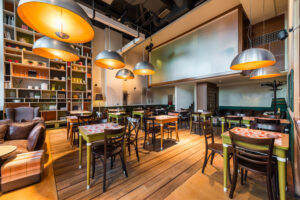
The rail strikes have had a worse impact on the UK’s hospitality industry than expected – costing bars, pubs, restaurants and hotels £1.5bn in December alone – according to the head of the body representing the sector.
Kate Nicholls, the chief executive of UKHospitality, said this had contributed to a “perfect storm” for businesses battling high energy bills and a cost of living crisis, adding this meant “undoubtedly we will see more business failures” in the next three months.
She said the recent rail strikes had hit the sector badly, causing a wave of cancellations of Christmas parties and dinners during the week of 12 December.
The industry body had estimated a £1.5bn hit from the strikes across December and January but it now says recent industrial action resulted in losses of that magnitude being racked up in the past month alone.
Nicholls told BBC Radio 4’s Today programme: “The hit in December was more significant than we were anticipating in terms of a slowdown in consumer footfall on the high street during that whole week.”
Rail unions led by the RMT have staged a series of strikes since June in a dispute over pay and working conditions. Several more strike days are planned next week, when the RMT is set to take action again across four days, while the Aslef union, which represents drivers, is staging a strike on 5 January.
UKHospitality has been tracking money coming through the tills and cancellations across the sector.
Nicholls said that after the train strikes were announced for the week of 12 December, “we saw cancellation rates as high as 50% to 60% in the centre of London, and 20% to 30% around the rest of the country directly attributable to those strike days”.
Footfall data for towns and city centres showed sales on strike days across the UK were down 27%, she said, while in central London and the City they had fallen 46%. Nicholls added that this had been happening through the year, since strike dates were first announced in May.
About 2,500 hospitality premises were forced to close in the last quarter and that trend is likely to continue in the new year because of the high cost of doing business, the UKHospitality boss said. “You’ve got businesses in a perfect storm with soaring energy bills, high input cost price inflation above 20% for the first time and the cost of living crisis hitting consumer confidence.
“It’s going to be undoubtedly a really tough first quarter for hospitality. It is traditionally a much quieter season for us – January, February – traditionally you get 70% of normal trading in those two months, whereas in December it is 130% of the normal month’s trading, so much more profitable sales in December being lost. That means those businesses are much more vulnerable and fragile going into January.”
She called for more support from the government on energy prices beyond April, when the current cap on prices ends.
Read more:
Rail strikes ‘cost UK hospitality sector £1.5bn in December alone’

